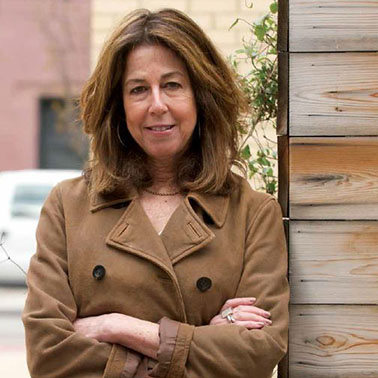Shocking the System
Ferguson. Charlottesville. Madison. New York. The list of cities with protests sparked by clashes between police and young black men seems to grow every week. From handcuffs to hard time, the juvenile justice system is frayed. For Marsha Levick, there is urgent work to do.
“We are shocking the system,” she says. “There is a growing movement to think differently about how we prosecute and sentence kids who commit crimes. We’re going to ride that wave of reform for as long and as far as we can.”
Credit for igniting that reform movement goes in no small measure to Levick, deputy director and chief counsel of Juvenile Law Center, in Philadelphia. Now, as a member of the Dean’s Council at SPEA, she is contributing to the education of the next wave of reformers, intent on sustaining the reforms of the last decade into 2020 and beyond. By then, the Juvenile Law Center she co-founded in 1975 will be approaching its 50th anniversary.
“I came of age and attended law school (Temple) in the 1970s,” she says. “There was a great sense of idealism then that we could change the world. We acted on it.”
Levick and three co-founders opened a walk-in legal clinic for any Philadelphia youth in trouble with the law. It is now the nation’s oldest nonprofit public-interest law firm for children, contributing to landmark U.S. Supreme Court rulings benefiting court-involved youth. She coauthored the lead child advocates’ amicus briefs in Roper v. Simmons, where the U. S. Supreme Court struck the juvenile death penalty under the Eighth Amendment, as well as other groundbreaking Supreme Court cases upending traditional thinking about kids in the justice system. The Law Center is also increasingly active outside the courtroom, working in legislatures, government agencies, and law schools to advance the rights of children.

“It is a new era in how we think about juveniles and crime. The pendulum has swung back. Crime has been dropping for the last 20 years. Fewer kids are being locked up.”
— Marsha Levick
As troubled as the juvenile justice system may seem in this Ferguson era, Levick remembers when it was worse. Crack cocaine flowed through cities in the 1980s and the easy availability of guns pushed crime rates and lawmakers into action: “Every legislature in the country increased penalties for juveniles, locking up teenagers with hardened criminals with long, mandatory sentences. As violent crime rose, the system was increasingly willing to throw away the lives of young offenders.”
Nowhere was that more apparent than in Luzerne County, Pennsylvania. In a Wilkes-Barre courthouse, two judges ordered teens behind bars for minor crimes. The judges were rewarded with kickbacks from the builder of for-profit detention centers for juveniles. Levick and the Juvenile Law Center intervened on behalf of the teens, saying their rights to effective counsel had been denied. Hillary Transue, for example, had been sentenced to three months in a juvenile camp because she lampooned her assistant principal on a MySpace page. As the case spread and the corruption charges mushroomed, Levick and her colleagues continued to fight for the young victims. The so-called Kids for Cash scandal is the subject of a 2013 documentary as well as a book, and the basis for several TV crime shows.
Due to the horror of cases like that and research showing that routine imprisonment of teenagers is ineffective, Levick says legislators, judges, and policymakers are now becoming more tolerant and thoughtful. “It is a new era in how we think about juveniles and crime,” she says. “The pendulum has swung back. Crime has been dropping for the last 20 years. Fewer kids are being locked up. All of society benefits from that, with safer streets, economic savings, and better outcomes for kids.”
As an example of that progress, Levick says Pennsylvania used to be home to 27 juvenile detention centers. Nine have closed in the last seven years. The progress isn’t just with institutions. Just before our conversation, Levick had spoken with Hillary Transue, one of the Kids for Cash victims. “She’s now in graduate school in a creative writing program,” Levick says. “She’s doing fabulously.”
Levick hastens to note that children of color are still overrepresented in the justice system and what is unfolding in Ferguson and its sister cities in the headlines suggests how much work is still to be done. Disparities in policing exacerbate disparities elsewhere in the system. Some old problems persist, even as new ones emerge. The Juvenile Law Center plans to advocate for reform of the sex offender registry and for a ban on solitary confinement of youth in prison. It is also pressing for more research into why children violate the law.
Levick says she seized the invitation to advance that research at SPEA through her involvement with the Dean’s Council: “There are multiple ways to get at reforming justice policy. Key among them is educating the next generation of stakeholders, in the hopes that they also become the next generation of reformers.” She had met longtime Dean’s Council member David Wang through their connection to the Southern Poverty Law Center. “There are so many opportunities to really transform how we treat and prosecute kids who commit crimes,” she says. “We’re going to keep pushing forward. I’m not burning out and I’ve been doing it a long time.”

